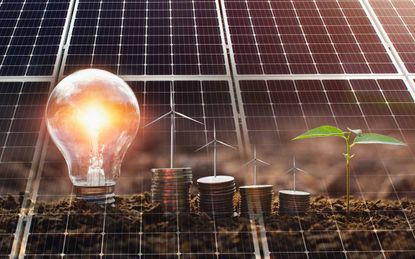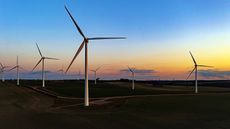PODCAST: Investing Green in a White-Hot Market
Sustainable stocks are going gangbusters. In an era of triple-digit gains for many market favorites (it's not just Tesla), we look for value options. Also, use your tax-day delay wisely.
- (opens in new tab)
- (opens in new tab)
- (opens in new tab)
- Newsletter sign up Newsletter


Listen Now:
Subscribe FREE wherever you listen:
Links and resources mentioned in this episode:
- Tax Day 2021: When's the Last Day to File Taxes? (opens in new tab)
- Most U.S. Taxpayers Don’t Know How Effects Of Pandemic Will Impact Their Taxes: Five Tax Myths Debunked (opens in new tab)
- Profit With These 7 Planet-Friendly Companies (opens in new tab)
- Earth-First Funds Are Soaring (opens in new tab)
- How Green Are Your Bonds? (opens in new tab)
Transcript
David Muhlbaum: Stock and fund investing meant to also help the environment is nothing new, but boy, has it been a hot sector this past year. In a market full of huge gains, how should you go green now? Executive editor Anne Kates Smith joins us with some stock and fund picks. Also, in a topsy-turvy 2021, Earth Day comes before Tax Day. We'll explain. That's all coming up on this episode of Your Money's Worth. Stick around.

Sign up for Kiplinger’s Free E-Newsletters
Profit and prosper with the best of expert advice on investing, taxes, retirement, personal finance and more - straight to your e-mail.
Profit and prosper with the best of expert advice - straight to your e-mail.
David Muhlbaum: Welcome to Your Money's Worth. I'm kiplinger.com senior editor David Muhlbaum, joined by my co-host, senior editor Sandy Block. How are you doing, Sandy?
Sandy Block: I'm doing good, David.
David Muhlbaum: Good. This podcast is going to drop just a few days before April 15th. And you know what that is, right?
Sandy Block: I know what it's not. It's not Tax Day.
David Muhlbaum: That's right, Sandy. It's not Tax Day. Yeah, of course, April 15th is traditionally the day when we're all supposed to have filed our prior year's taxes or filed for an extension, and traditionally we'd be telling you all sorts of smart moves to make if you're a tax procrastinator, but this year, we're not, not because we don't want to be helpful, but because this year, April 15th is not Tax Day.
Sandy Block: No, this year, basically because of the COVID-19 pandemic, the deadline has been extended to May 17, 2020. So you get an extra month. And that's not just to file your taxes, but also important things like contributing to an individual retirement account or collecting a refund from three years back.
David Muhlbaum: Enjoy your month, I guess. Maybe you knew, maybe you didn't. We got a study across the transom from NORC at the University of Chicago (opens in new tab), a research outfit, about what Americans do know about their taxes and it was, well, not reassuring. We got some work to do, you and me, Sandy.
Sandy Block: Well, yeah. But our audience, they know stuff.
David Muhlbaum: Well, let us hope so. But they might know some people who don't know as much.
Sandy Block: Right. So go ahead, tell me the bad news, I'll try not to be smug.
David Muhlbaum: Okay. So the survey was framed as a pop quiz. Five questions about tax myths. Can't do all five for reasons of time, but I'll ask you one. No, I'll do two. I'm going to do the one most people got wrong, and the one most people got right. The first question: People don't have to pay taxes if they didn't earn any income?
Sandy Block: If they didn't earn any income? That's wrong. There are plenty of forms of unearned income, interest, dividends, alimony, lottery winnings. But I only have to change one word to change the answer. If you didn't have any income, you don't have to pay any taxes.
David Muhlbaum: If you didn't have any income.
Sandy Block: If you didn't have any income, you don't have to pay taxes. And this is skipping right over the earned income tax credit, which is really complicated.
David Muhlbaum: Which is a credit, so it comes after your tax obligation, but well, we're getting in the weeds.
Sandy Block: As we do. So that was the question most people got right or wrong?
David Muhlbaum: That was the question most people got wrong. Fewer than a third of people got that one right.
Sandy Block: I'd say that's a reflection of the fact that not a lot of Americans have unearned income. You work a job, you get a W-2 or a 1099 form, there's your earnings. Okay, but what was the question that most people did well on?
David Muhlbaum: That question was: There are no taxes on side-hustle income?
Sandy Block: Oh, we just did side hustles on this podcast (opens in new tab). Taxable, of course.
David Muhlbaum: Yeah. Right. And the respondents got that too. In fact, over 3/4 of respondents got it right. But overall, on the five questions in total, just one in 20 U.S. taxpayers, 5%, answered all five questions correctly. On average, respondents answered fewer than three questions correctly. The precise score was 2.89 out of five.
Sandy Block: Well, search kiplinger.com/taxes (opens in new tab) with your extra month of time. Not for you, of course, but for your friend who really needs help.
David Muhlbaum: Of course.
David Muhlbaum: When we return: Green investing, it's hot. What's really green and what's someone who wants to get into this sector, with such nosebleed prices, supposed to do now?
David Muhlbaum: Welcome back to Your Money's Worth. Executive editor Anne Smith is joining us today to discuss the cover story, stories actually, from Kiplinger's personal finance on green investing. Because, you know, Earth Day.
Sandy Block: Earth Day is every day.
David Muhlbaum: And every day is Earth Day, true, but it's also April 22nd this year and every year and that's just around the corner. So, welcome Anne, as we enjoy a beautiful spring day here, one of those days that makes you think, Hey, maybe everything really is okay in the world and the climate, et cetera, when it isn't. Just read another grim headline from The Washington Post on a new record for carbon dioxide levels, as measured at the Mauna Loa Observatory in Hawaii. Last year's global temperature tied for the hottest on record with 2016. But speaking of heat, we appreciate that climate change is a hot-button issue that not everyone agrees on, we're not here to debate that today. Rather, as Anne can tell us in more detail, investors are very eager to invest in stocks, funds, and bonds that claim to combat climate change, improve sustainability and other environmental goals. You know, follow the money. We are hoping that in our Kiplinger way, to give you guidance on doing that in a way that's most profitable. Wow. Okay Anne, hi, thanks for joining us. Please excuse my lengthy preamble.
Anne Kates Smith: Happy to be here. It used to be, we've been writing about green investing for as long as I've been working at Kiplinger, which I'm not even going to go into it. It used to be that if you wanted to put your money where your beliefs were, when it came to investing in ESG stocks, and ESG stands for Environmental, Social, Corporate Governance values, then you had very few choices and you probably were going to sacrifice some returns. And so the investing philosophy back in the day was, make as much money as you can in the stock market and use those profits to support whatever causes you feel like supporting.
David Muhlbaum: Like write a check, make a charitable donation?
Anne Kates Smith: Exactly. With the money that you make. But these days the choices are more than plentiful, and you definitely don't have to sacrifice returns. ESG investing has not just gone mainstream, it's pretty much taken over. Even in 2020 when people were fleeing the stock market and more money flowed out of U.S. stock funds than went into them, that was not the case with sustainable funds. And those are not just climate funds, sustainable is another word for ESG. So it includes those social and corporate aspects as well, but they are popular investments and some of them are up, two, three, four, six fold. So, no more sacrifice.
Sandy Block: So Anne, thanks for explaining the acronym ESG. And as you pointed out, it covers a variety of investing goals. But the focus of this round of Kiplinger's coverage was on the E, the environment. How come?
Anne Kates Smith: Well, because of Earth Day. We have done a lot of stories in the past year on other aspects of ESG, companies that are great to work for, for instance, and other stories. But this time we wanted to focus on the environmental aspect. Again, this is where the money is flowing. BlackRock, the huge investing giant recently did a survey and they found out that climate related risks are at the top of mind for investors who are investing in ESG funds. In other words, the E is top of mind in the ESG world. And the funds are, like I said, are just raking in money, $50 billion in 2020 into sustainable funds. There have been records set for three or four of the past years and that's double the record set in 2019. And it's 24% of inflows into all U.S. stock and bond funds last year. So, it's just raining money on these ESG funds.
David Muhlbaum: So it's white-hot. I imagine that presents hazards of its own, particularly for people who want to get in now. Like the market broadly speaking has been hitting new highs this year and a lot of those gains are concentrated in green stocks.
Anne Kates Smith: They have been. So, for instance, when we wrote about green stocks in 2020 (opens in new tab), our theme was that these stocks are going mainstream, that they're being picked up widely by investors. And, in fact, the six stocks that we recommended in that 2020 story are up about 80% on average, just looking at my list here. We had one stock, TPI Composites, that makes the blades for wind turbines. So it was up 176%. Our worst performer was Waste Management. And even that was up more than 8%. And just for comparison, the S&P over that time period was up about 27%. So, the stocks have done very well.
David Muhlbaum: So if you listened to us last year, you could have done well too?
Anne Kates Smith: Definitely. Yes.
David Muhlbaum: Let's gloat a little! It's nice to be right. It doesn't always happen.
Anne Kates Smith: It was easy to be right in that sector, but that made it a little bit more difficult this time around in 2021, when we wanted to write about green stocks with such a big run-up. We've gone well past mainstream with this investing, we had to examine whether or not the stocks were in a bubble and overvalued and ready for a pullback. For instance, I mentioned TPI Composites, that's a great company with a great future, but it's trading at nearly 70 times earnings still. So we're not recommending it for new investors. This year you have to balance your green exposure while also managing risk. This year we focused on, as much as we can say, value-priced plays (opens in new tab). They may not be value price plays in the conventional sense, but they're not as high flying as some of the other green stocks. We looked at green chips for the long haul, companies that you can buy and hold, and some indirect plays to the climate and the whole green sector.
Sandy Block: So, Anne, you mentioned green chips, and maybe we could start by explaining what those are. Sort of the, I guess, environmental version of blue chip stocks?
Anne Kates Smith: Exactly. They're the cream of the crop, they're well-managed companies with sizable market shares. They're considered market leaders in their industries. And the two green stocks on our list this year are NextEra Energy, a big utility and Xylem, which is a water treatment company. NextEra is based in Florida, traces its roots back to Florida Power and Light. So it's still part stodgy electric utility. It's got a secure dividend, yielding about 2%, but it also has a clean energy arm with a sizable and growing portfolio, wind, solar, and battery storage projects. NextEra, says it believes it can construct 23 to 30 gigawatts of new renewable energy projects through 2024. To give you an idea of the growth rate here, that's one and a half times the size of its entire portfolio at the end of 2019.
David Muhlbaum: Okay. That's growth.
Anne Kates Smith: That's growth. Xylem is about water, not energy per se, but that's got an obvious green connection. It uses innovative methods to upgrade water infrastructure, delivering clean water to people in about 150 companies, so it's got a global reach. Xylem has digital data-driven approaches to water usage. You think about smart meters and sensors that detect pipe leaks, for example, and it serves industrial firms, utilities, municipalities, and homeowners, helping them to conserve and manage water. Xylem technology also helps to reduce the amount of, and excuse this corporate speak here, non-revenue water. That's a term for the 30 to 40% of water worldwide that's lost due to leaks, unauthorized use and just basic inefficiencies.
David Muhlbaum: Yeah. It's like the water that gets wasted before we have the chance to waste it.
Anne Kates Smith: Correct.
Sandy Block: It's like the water in my basement, right? It's non-revenue water.
Anne Kates Smith: No.
David Muhlbaum: That's expensive water. That's going to cost you, Sandy.
Anne Kates Smith: Yeah. That's very expensive water. Xylem also has treatment technologies to remove harmful pollutants from water and wastewater. So it pretty much spans the gamut in a water treatment technology.
David Muhlbaum: Water is life. I think that's someone else's tagline. Jeopardy question, who knows why it's called Xylem?
Sandy Block: No idea.
David Muhlbaum: Xylem is the part in plant tissue that moves water through the plant. Up or down kind of depending on the season.
Anne Kates Smith: Wow, back to my botany 101 days.
David Muhlbaum: Yeah. So, well, it's green. Back to the stocks. I noticed that your 2021 list has a major electric car maker on it, but its name does not start with T.
Anne Kates Smith: That's right. I told you we were taking a value approach. The car maker in question is General Motors, not Tesla. I don't want to get sidetracked into a discussion of Tesla's value or it's ever moving price targets or any of that, but I don't think I'd get a ton of argument if I were to call it a high flyer. I think the P/E ratio for Tesla doesn't even measure on our scale. GM isn't as sexy as Tesla, maybe, but it's a big player with a huge commitment to the EV market. It's up nearly 50% so far this year. Tesla's down about two over the same period, and for context, the S&P is up about nine. Over the past 12 months, full year, GM is up nearly 220%.
Sandy Block: Oh wow.
Anne Kates Smith: Yeah, not shabby, not as much as Tesla, up about six fold, but not shabby. And I can tell you, the chart is a lot smoother. And GM sells for about 12 times expected earnings.
David Muhlbaum: I know we're talking stocks, not cars, but I just have to interject that I saw some video of GM's new electric truck, the Hummer EV SUV, and that thing is just nuts. It's not just that it's electric, it's how being electric enhances its off-roading capabilities. The thing can crab sideways. I can't tell you that the production Hummer, which is expected to be out next year will be any good, but I can tell you that GM certainly seems capable of generating buzz. Anyway Anne, I'd like to pivot from stocks in part because people can see the other ones we're recommending for 2021 in the story, Profit From Planet Friendly Companies (opens in new tab), which we will link to in the show notes, and in part because a whole lot of the activity in ESG investing is in funds. In fact, that's kind of where the whole concept got its start. And in the April forecast, the cover stories, you've got a bunch of ETFs, a handful of bond funds, and one mutual fund that invests in stocks. And all of these are green.?
Anne Kates Smith: Yeah, there are very few pure green plays in the fund world. Most of these funds pay attention to other so-called sustainable investing principles as well. And we're talking about the social values and corporate governance practices that make up the second two letters in ESG. But we chose these funds for their focus on the E or the environmental component of ESG.
Sandy Block: Okay. Can I ask for an explainer then? Because, when we talk about individual companies and stocks, we can make our own assessment of whether a company is doing something green, significant. Some are self-evident, like a company that makes wind turbine blades. Others you got to think about, like General Motors and see what the long-term objectives are. But for funds, who says, "Yeah, this fund is green."?
Anne Kates Smith: And that's a whole other can of worms. There are a host of raters, more coming in every day, each with their own metrics. And one of them that we refer to a lot is the ginormous investment research firm Morningstar. With Morningstar, a low ESG score is better. It's a dynamic area. There are some controversies. Some companies can be accused of greenwashing, for instance, making some of their practices look greener than they actually are. But with funds, here's the deal, you can look at how a fund identifies itself and read the prospectus, see what they consider green and see what they demand as part of their investment criteria before they invest in a stock.
David Muhlbaum: Yeah. I just read an article we posted in our Building Wealth Channel by a financial advisor named Peter Krull (opens in new tab), about the distinctions between socially responsible investing -- SRI -- and ESG -- environmental, social, and governance investing, the term we've been using. In short, he says, don't use those interchangeably. We could probably do a whole podcast on that alone, maybe. But I bring that up kind of to say that, we're aware of these issues and there are differing opinions on what's green or green enough, but... Anne, to put us back on track, give us a high level look at how ESG funds are faring. We did talk about inflows.
Anne Kates Smith: Yeah. And I'll just say one more thing about the labels. And this is particularly true in the green bond investing area. There are many, many labels, each with its own set of metrics and criteria. If you limit yourself to the investments that fall within those labels, then you are limiting your universe of investments. So it is a subjective area, and it helps if you do your own homework and keep an open mind. But back to the funds, they are very hot, funds that you invest with environmental concerns in mind have just sizzled. Some have posted triple-digit returns over the past 12 months. And like we've mentioned, investors have just poured money into these funds. The $50 billion that went in in 2020 is more than double the record set in 2019. And it's about 24% of overall inflows into U.S. stock funds for the year.
Sandy Block: Wow. I mean, that's incredible.
Anne Kates Smith: Yeah. Sustainable investing hasn't just arrived, it's taken over. And you can particularly see that in 2020, because U.S. stock investors pulled money out of funds or, investors pulled money out of U.S. stock funds, let me put it that way. But inflows into sustainable funds, ESG funds were positive. So I think that says a lot about how people are consistent investors when they're putting their money where their values are. Also, one other fact, four of the top 10 sustainable funds with the biggest inflows in 2020 were focused on renewable energy. So, particularly hot there. When we talked to Jon Hale, who's the head of sustainability research at Morningstar, he characterized some of the excitement in this area as performance chasing. But you have to put that in perspective, the commitment to green energy from the Biden administration and the future there over the long haul means that the potential is still there.
Sandy Block: And speaking of performance chasing, maybe one of your fund choices, Invesco WilderHill Clean Energy, certainly looks like it's doing very, very well. You could argue that investing in that was going after performance.
Anne Kates Smith: Well, to put it in context, that fund is up about 273% over the past 12 months. So a lot of performance to chase there, but we had already added that fund to the Kiplinger ETF 20, which is the list of our favorite ETFs last year. So, that tracks an index of companies that focuses on green and renewable energy sources like wind, solar, hydro, geothermal, biofuel. It also looks at companies involved in energy storage, clean energy, conversion. Some of these stocks are up over a 1000% in the past year, but we have to warn our readers and listeners that volatility works both ways. The ride in this fund can be a little bit bumpy, and to be honest, it's down about 4% so far this year. Still has that 272.97% gain for the past 12 months. But you have to be prepared for a little bit of volatility.
Sandy Block: Okay. So I'm green, but I don't like volatility. Can you recommend something that maybe is a little calmer for my portfolio?
Anne Kates Smith: Well, there are different things you can do to ameliorate some of those concerns. Like we mentioned, the ETF that's equal weighted, that means that some of the highest-priced stocks, that can be the most volatile and risky, don't dominate the returns. But there's another one, the one mutual fund that we recommended, Fidelity Select Environment and Alternative Energy Portfolio. That's a mouthful. The symbol there is FSLEX (opens in new tab). The fund is a diversified approach to companies tackling climate change. It holds stocks in every sector, for instance.
Anne Kates Smith: Mostly companies that get about one quarter of their revenue tied to a smorgasbord of environmentally friendly pursuits. And that means fuel efficiency, generating renewable energy, building water infrastructure, recycling, stuff like that. That means that it holds a handful of big, traditional blue chips. One of them is Honeywell, the giant industrial conglomerate. And it's got Honeywell because that company works with building owners to install more energy efficient systems. 3M is another big conglomerate that's in there. 3M is a huge supplier to solar and wind companies. The fund has lagged the S&P over the past three years, but it's beaten the S&P year-to-date and over the past 12 months and it's neck and neck over the past five years.
David Muhlbaum: Okay. So here I go, talking about my family again, but my younger daughter wants to invest some of the money she saved up from babysitting, gifts and the like, in a green fund. She's off at school in Vermont right now where they go to class and run an organic farm, so it's all very on-brand, if you know what I mean. So I started looking at some of these funds and my God... I keep seeing Tesla as a holding! Like, for that one we were just talking about, Fidelity Select Environment and Alternative Energy Portfolio, it's number one. They literally have twice as much Tesla as Honeywell. I mean, I imagine a part of this is with the way Tesla shares have been rising, it's going to get up there in fund holdings. But it's not exactly reassuring to see this hot potato of a stock keep popping up. To me that is, I don't think my daughter cares. Her concern is finding a fund that has a manageable minimum investment.
Anne Kates Smith: Well, I'll tell you, it's not uncommon to find Tesla in a green fund, but I just have to say, it's by far and away not the only overvalued green stock out there. Tesla has its supporters. It's a company for the long haul, they say. But here's the thing about mutual funds, David, if you hire a pro to manage your green investments, part of the privilege and the benefit of that is leaving those decisions to the fund manager. Now, if you're uncomfortable with that kind of volatility and that kind of risk, you can check the holdings. Mutual funds disclose their holdings periodically, most ETFs do so daily, but you also use some other criteria to choose a fund. You compare expenses, you try to buy a low-expense fund for instance, that's extremely important, and you buy a track record. You don't have to second guess the manager, that's the beauty of buying a fund until such time as that fund no longer suits your needs or the track record crumbles.
David Muhlbaum: It's interesting you mentioned those important parameters in choosing a fund. In the process of trying to advise my daughter, I found myself very much going through those parameters and reminding myself again, why those matter and how we go about picking mutual funds, and it was an interesting opportunity to riff on what I hope I've learned over the years, and that you helped teach us all. There are four other funds in Earth-First Funds Are Soaring (opens in new tab) that we didn't get to today. I'm going to put a link into that article as well. And as long as we're talking about things that we didn't have time for, we briefly mentioned bond funds, but we don't have time to really dig into that today, but there are green bond funds as well. And again, I'll put a link to that article as well so you can just keep on digging into all the green content that we have put together for Earth Day. Anne, thank you very much for joining us today. We appreciate your insights.
Anne Kates Smith: Oh, it's my pleasure. Happy Earth Day.
Sandy Block: You too.
David Muhlbaum: And that will just about do it for this episode of Your Money's Worth. If you like what you heard, please sign up for more at Apple Podcasts (opens in new tab) or wherever you get your content. When you do, please give us a rating and a review. If you've already subscribed, thanks. Please go back and add a rating or a review if you haven't already, it matters. To see the links we've mentioned in our show, along with other great Kiplinger content on the topics we've discussed, go to kiplinger.com/podcast. The episodes, transcripts, and links are all in there by date. And if you're still here because you wanted to give us a piece of your mind, you can stay connected with us on Twitter, Facebook, Instagram, or by emailing us directly at podcast@kiplinger.com. Thanks for listening.

Block joined Kiplinger in June 2012 from USA Today, where she was a reporter and personal finance columnist for more than 15 years. Prior to that, she worked for the Akron Beacon-Journal and Dow Jones Newswires. In 1993, she was a Knight-Bagehot fellow in economics and business journalism at the Columbia University Graduate School of Journalism. She has a BA in communications from Bethany College in Bethany, W.Va.
-
-
 How to Find the Cheapest Home Insurance Policy
How to Find the Cheapest Home Insurance PolicyHomeowners insurance can help cover your home in the event of a burglary, fire or natural disaster and the following tips can help you score the cheapest policies.
By Erin Bendig • Published
-
 Are You Guilty of Financial Infidelity?
Are You Guilty of Financial Infidelity?Nearly one in four Americans are keeping money-related secrets from their partners.
By Emma Patch • Published
-
 Value Investing Is Back
Value Investing Is BackValue investing beats growth in the long run, and the best way to participate in value is through funds.
By James K. Glassman • Published
-
 Best Consumer Discretionary Stocks to Buy Now
Best Consumer Discretionary Stocks to Buy NowConsumer discretionary stocks have been challenging places to invest in, but these picks could overcome several sector headwinds.
By Will Ashworth • Published
-
 Best Communication Services Stocks to Buy Now
Best Communication Services Stocks to Buy NowDespite continued macro headwinds, pockets of opportunity remain among the best communication services stocks.
By Tom Taulli • Published
-
 Best Mid-Cap Stocks to Buy Now
Best Mid-Cap Stocks to Buy NowThe best mid-cap stocks are the market's so-called "sweet spot," offering up an ideal combination of financial stability and growth potential.
By Will Ashworth • Published
-
 The Best ETFs to Buy Now
The Best ETFs to Buy NowFinding the best ETFs to buy in a high-inflation environment can seem like a tall task, but these five picks are a good place to start.
By Charles Lewis Sizemore, CFA • Published
-
 The 9 Best Consumer Staples Stocks to Buy
The 9 Best Consumer Staples Stocks to BuyIn an uncertain market, the best consumer staples stocks provide consistency and stability to portfolios.
By Jeff Reeves • Published
-
 The 9 Best Tech Stocks to Buy Now
The 9 Best Tech Stocks to Buy NowThe tide could be turning for the beaten-down technology sector, which makes these top tech stocks worth a closer look.
By Tom Taulli • Published
-
 The 9 Best Utility Stocks to Buy Now
The 9 Best Utility Stocks to Buy NowIncome investors like utility stocks for their stability and generous dividends. Here are nine to watch in an uncertain market.
By Jeff Reeves • Published









